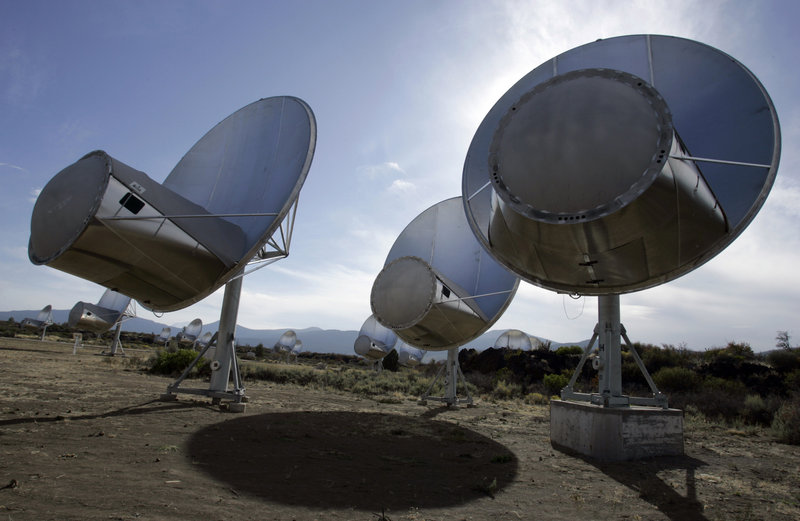SAN FRANCISCO – In the mountains of Northern California, a field of radio dishes that look like giant dinner plates waited for years for the first call from intelligent life among the stars.
But they’re not listening anymore.
Cash-strapped governments, it seems, can no longer pay the interstellar phone bill.
Astronomers at the SETI Institute said a steep drop in state and federal funds has forced the shutdown of the Allen Telescope Array, a powerful tool in the search for extraterrestrial intelligence, an effort scientists refer to as SETI.
“There’s plenty of cosmic real estate that looks promising,” Seth Shostak, senior astronomer at the institute, said Tuesday. “We’ve lost the instrument that’s best for zeroing in on these better targets.”
The shutdown came just as researchers were preparing to point the radio dishes at a batch of new planets.
About 50 or 60 of those planets appear to be about the right distance from stars to have temperatures that could make them habitable, Shostak said.
The 42 radio dishes had scanned deep space since 2007 for signals from alien civilizations while also conducting research into the structure and origin of the universe.
SETI Institute chief executive Tom Pierson said in an email to donors last week that the University of California, Berkeley, has run out of money for day-to-day operation of the dishes.
“Unfortunately, today’s government budgetary environment is very difficult, and new solutions must be found,” Pierson wrote.
The $50 million array was built by SETI and UC Berkeley with the help of a $30 million donation from Microsoft Corp. co-founder Paul Allen. Operating the dishes costs about $1.5 million a year, mostly to pay for the staff of eight to 10 researchers and technicians.
An additional $1 million a year was needed to collect and sift the data from the dishes.
The Paul G. Allen Family Foundation, the billionaire’s philanthropic venture, had no immediate plans to provide more funding to the facility, said David Postman, a foundation spokesman.
The institute, however, was hopeful that the Air Force might find the dishes useful as part of its mission to track space debris and provide funding to keep the equipment operating.
The SETI Institute was founded in 1984 and has received funding from NASA, the National Science Foundation and several other federal programs and private foundations. Other projects that will continue include the development of software and tools to be used in the search for extraterrestrial life.
Despite the shutdown of the Allen Telescope Array, the search for extraterrestrial life will go on using other telescopes such as a dish at Arecibo in Puerto Rico, the largest radio telescope in the world, Shostak said.
The difference, he said, was that SETI researchers can point the Arecibo telescope at selected sites in space for only about two weeks a year.
Send questions/comments to the editors.



Success. Please wait for the page to reload. If the page does not reload within 5 seconds, please refresh the page.
Enter your email and password to access comments.
Hi, to comment on stories you must . This profile is in addition to your subscription and website login.
Already have a commenting profile? .
Invalid username/password.
Please check your email to confirm and complete your registration.
Only subscribers are eligible to post comments. Please subscribe or login first for digital access. Here’s why.
Use the form below to reset your password. When you've submitted your account email, we will send an email with a reset code.